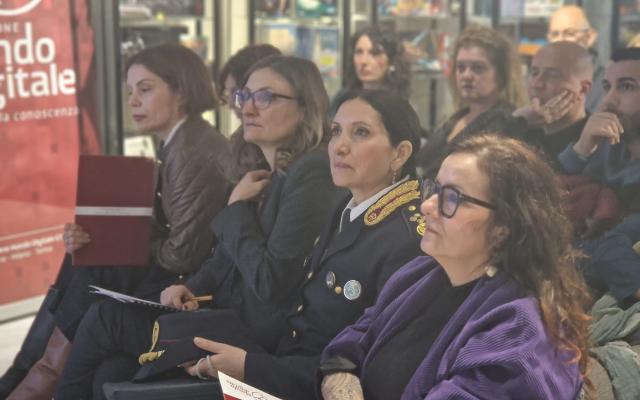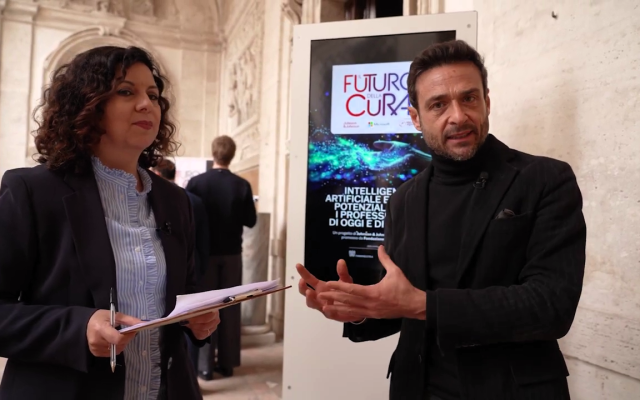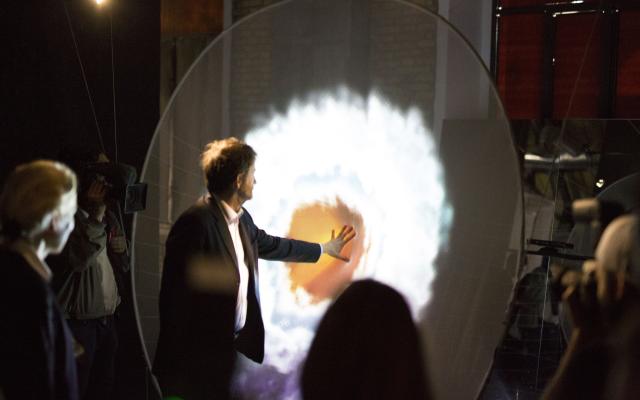After the summer break, here we are again with our weekly appointments with “Our School” Professors. Today, we travel to Puglia to meet Chiara Ivana Cuccorese, who has a degree in classical literature with a philological-linguistic specialisation and teaches literature, Latin and Greek. She has always been passionate about writing and has published a volume entitled “Sogno, seduzione e sentimento” (Ismeca, 2009). Chara also earned the title “Systems and Learning Evaluation Coach” from the Regional School Office of Bari in 2015 and has worked as an educator at both Mondadori and Rizzoli Education.
With “Our School,” Chiara Ivana has developed a collaborative course based on virtual service learning to address the issue of cultural integration. As usual, we share a short self-presentation video and then the interview with researcher Ilaria Gaudiello, who coordinates the works of the open source community of professors and educators.
INTERVIEW
What does teaching mean to you?
I like to think of teachers as intellectuals, cultural mediators who can educate to global citizenship and global ethics. I hope to instil this in my students, as per the Latin root of magistra, and provide all of them with the opportunity to move towards the knowledge that will allow each of them to give greater value to their lives.
What values guide you in your mission as a teacher and educator?
I am certain that civil cohabitation is based on our Constitution. It contains all the values that underline the fundamental rights and duties in a civil state. Today, more than ever before, we need teachers who know how to provide a strong example.
How do you imagine the school of the future?
As a school founded on the importance of looking for meaning, open to foreign literature, and with an interdisciplinary approach, so to establish connections between the imagination of our youth and our historical creative heritage. Unfortunately, the various measures implemented by governments have bureaucratised teaching. I hope that the school of the future will encourage teachers to act as cultural and intellectual mediators, who will be capable of drawing connections between values and views of the world, between the past and the present, to develop new ideas with their students based on innovation, quality and inclusion.
Plato wrote “Man is a domestic animal and yet if he receives a correct education and gets good dispositions from nature, then he usually becomes the most divine and civil being there is. However, if he has not been sufficiently educated, or has had the wrong training, then he transforms himself into the most ferocious of animals that the earth has ever generated. This is therefore the reason why the authority that establishes the laws must never overshadow the question of the education of young people among the minor problems. Indeed, his first concern must be to ensure a good choice of those who will have the task of taking care of the young.” Therefore, the school of the future is a strategic lever for our country that will be able to instil respect for individuals, legality and marvellous opportunities through diversity in all our future citizens.
In your career as a teacher, how have digital tools supported innovation and inclusion?
Throughout my career, digital tools have been fundamental. They have provided an unprecedented acceleration and supported the motivation and creativity of students. During the Sars-Cov2 pandemic, they were also a fundamental tool for the evaluation of students.
Why did you choose to join “Our School”?
True research and experimentation can also arise from confrontation. At school, professors are often soloists, while “Our School” brings talent together to amplify is transformative potential and give greater value and power to collaboration and teamwork.
What stands out in your experience?
Together with my team, we developed a virtual service-learning project entitled “Venuti da lontano” (Come from Afar) which aims to create a culture of respect for diversity and solidarity. “I have the audacity,” said Martin Luther King, “to believe that peoples everywhere can have three meals a day for their bodies, education and culture of their minds, and dignity, equality, and freedom for their spirits. We will not be satisfied until integration will no longer be a problem, but an opportunity to participate in the beauty of diversity.” We are convinced that school has a responsibility, as well as the opportunity, to build a better future based on respect for individuals and solidarity.
Do you have another dream school project?
I would like to develop a frequential dictionary of Greek with “Our School” using augmented reality. I am certain that it could help students improve their memories and associate signifiers and significants, giving them the opportunity to work on the etymology of words. In this context, I would recommend reading
Vera Gheno’s essay on “Power to Words,” as it helps understand how the true freedom of people depend on their conquest of words.
What are your hopes for the future of the “Our School” community?
I hope “Our School” will be increasingly involved in a more meaningful way at the national level in teacher training activities so that Italian school will finally replace the “I” with the “Us”, promoting the spirit of collaboration underlying every form of research and experimentation.



